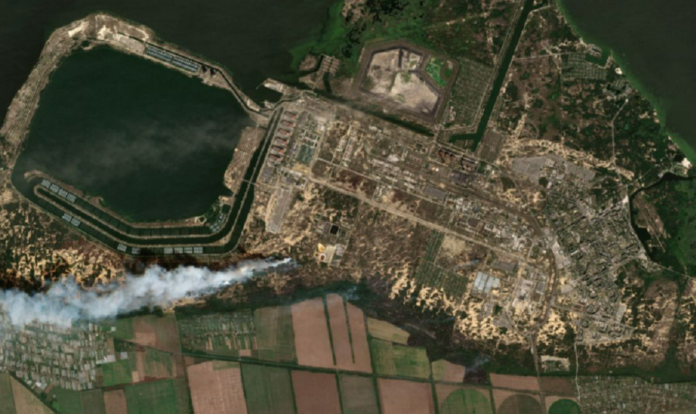The world narrowly escaped a radiation disaster when electricity to Europe’s largest nuclear power plant was cut for hours, Ukraine‘s president said, urging international bodies to act faster to force Russian troops to vacate the site, according to Reuters.
President Volodymyr Zelensky said Russian shelling on Thursday had sparked fires in the ash pits of a nearby coal power station that disconnected the Zaporozhzhia plant from the power grid. A Russian official said Ukraine was to blame.
Back-up diesel generators ensured power supply that is vital for cooling and safety systems at the plant, Zelensky said, praising the Ukrainian technicians who operate the plant under the gaze of the Russian military.
“If our station staff had not reacted after the blackout, then we would have already been forced to overcome the consequences of a radiation accident,” he said in a video address on Thursday evening.
“Russia has put Ukraine and all Europeans in a situation one step away from a radiation disaster… Every minute that Russian troops remain at the nuclear power station there is a risk of global radiation catastrophe,” he added.
Energoatom said electricity for the plant’s own needs was currently being supplied through a power line from Ukraine’s electricity system, and that work was ongoing to restore grid connection to the plant’s two functioning reactors.
Vladimir Rogov, a Russian-appointed official in the occupied town of Enerhodar near the plant, blamed Ukraine’s armed forces for the incident, saying they caused a fire in a forest near the plant. He said local towns had lost power for several hours.
“This was caused by the disconnection of power lines from the Zaporizhzhia nuclear power station as a result of provocations by Zelensky’s fighters,” Rogov wrote on Telegram. “The disconnection itself was triggered by a fire and short circuit on the power lines.”
Energoatom said it had been the first complete disconnection in the plant, which has become a hotspot in the six-month-old war.
The United Nations is seeking access to the plant and has called for the area to be demilitarised. International Atomic Energy Agency (IAEA) officials are “very, very close” to being able to visit Zaporizhzhia, agency Director-General Rafael Grossi said on Thursday.


